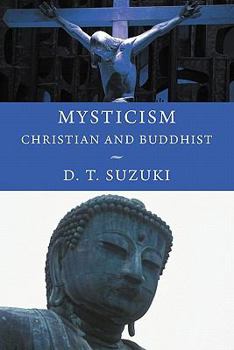Mysticism: Christian and Buddhist
Select Format
Select Condition 
Book Overview
If the Western world knows anything about Zen Buddhism, it is down to the efforts of one remarkable man, D.T. Suzuki. The twenty-seven year-old Japanese scholar first visited the West in 1897, and... This description may be from another edition of this product.
Format:Paperback
Language:English
ISBN:1926777271
ISBN13:9781926777276
Release Date:March 2011
Publisher:Eremitical Press
Length:230 Pages
Weight:0.80 lbs.
Dimensions:0.5" x 6.0" x 9.0"
Customer Reviews
2 ratings
A long shot at interfaith dialogue
Published by Thriftbooks.com User , 18 years ago
D.T. Suzuki was in his time a well known scholar on Buddhism, especially the Japanese Zen variety, and was later appointed a Professor of Buddhist Philosophy. In 1948 Suzuki studied some sermons of Meister Eckhart and wrote this little book, pointing out what he felt were the close connections between the Meister's ideas and those of Zen Buddhism. Having studied both Christian and Buddhist spiritual traditions myself quite closely, I think Suzuki has tried but failed to find common ground between these two great world religions. Nowhere in Eckhart's sermons or tracts for example, does Eckhart conceive of God as Buddhist 'emptiness' or 'shunyata.' While it is true Eckhart felt God was One, and this One was above being itself, Eckhart also believed this One was a Trinity and contained a super-richness or overflowing of being, rather than a void which mysteriously and transcendently is the source of all other things. The Buddhist ideas which Suzuki refers to have far more in common with those of Oriental mysticism, such as the Tao of Lao Tzu or the Brahman of the Upanishads. Eckhart's idea is closer to Gregory of Nyssa or Dionysius, who saw God as infinite, perfectly One, incomprehensible but also a Trinity. However many of Eckhart's ideas do have paralells in Buddhism, especially those on 'detachment', imageless contemplation (something shared with Evagrius Ponticus, a 4th century Eastern Christian monk) and the ground of the soul, which may be compared with the Buddhist notion of the inherent 'Buddha nature' shared by all beings. Yet, I think Eckhart is best considered what he really was, a Catholic mystic who saw himself as an Orthodox Christian through and through, rather than a Zen master in disguise.
Nonduality, East and West
Published by Thriftbooks.com User , 19 years ago
The great scholar of Zen Buddhism does the kind of careful and insightful work he is known for, here comparing the Christian mysticism of Meister Eckhart, (a 13th and 14th century Christian mystic) with core Buddhist teachings. The insights of a Christian mystic and a Buddhist differ in words, but reflect the same underlying experience of union with the Ineffable Suchness that is God or Tathata. I value this book deeply for its subject matter. Be advised, this is not light reading or "beach reading" as Eckhart can be somewhat impenetrable at times. But Suzuki is very adept at interpreting him and gets to the essentials, making it a book to be ingested slowly, meditatively.






